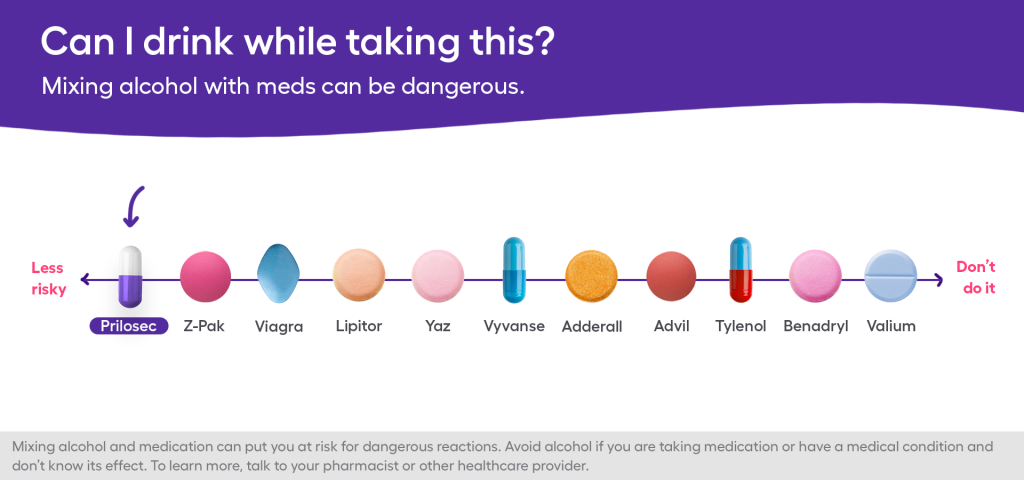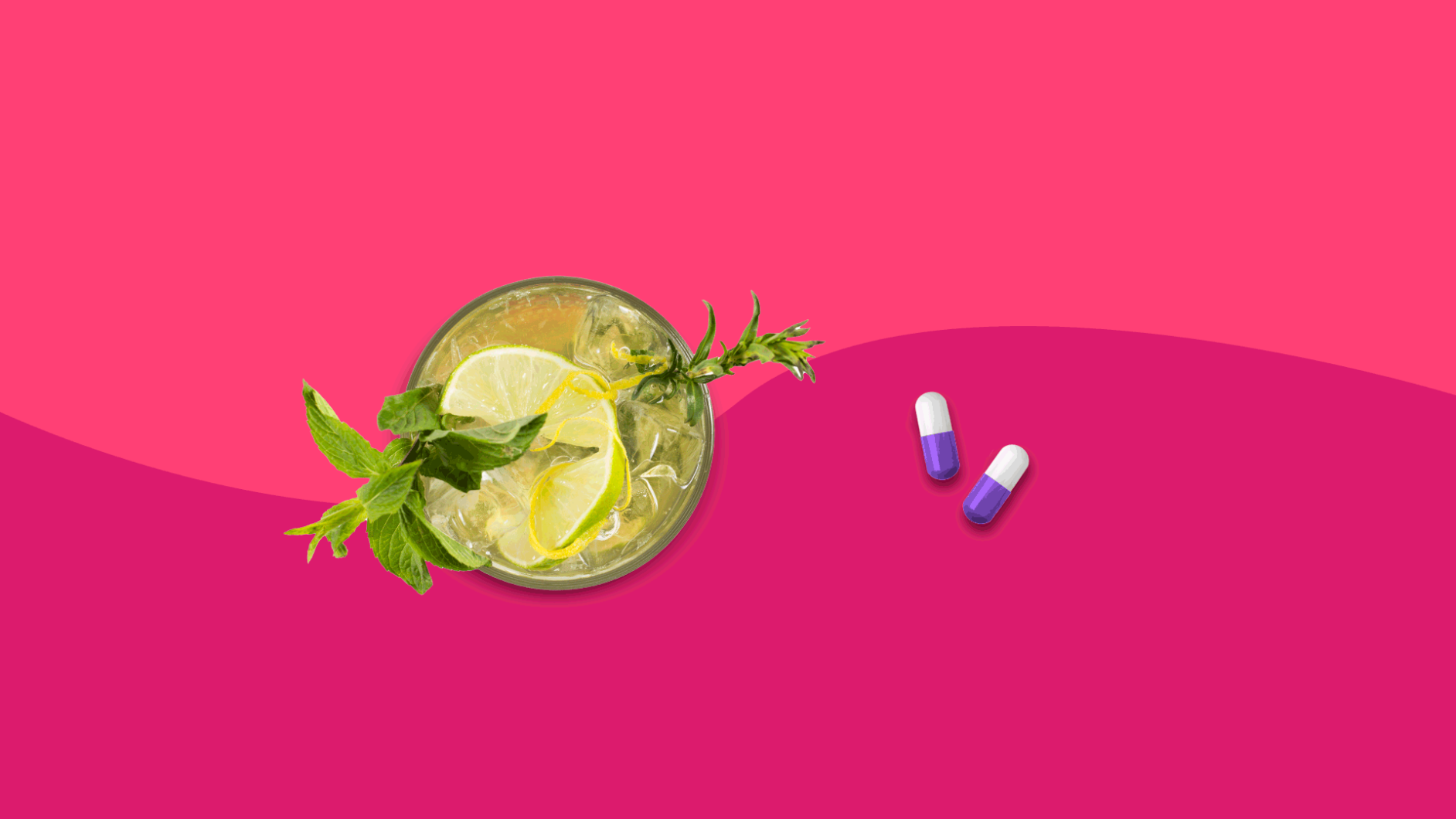Key takeaways
Mixing alcohol with heartburn medication, including over-the-counter options and prescription drugs, is generally safe. However, there are a few caveats.
Alcohol can exacerbate heartburn symptoms, and certain alcoholic beverages like red wine and those mixed with caffeine (such as rum and cola) are more likely to cause heartburn.
Patients prescribed metoclopramide for heartburn should avoid alcohol, as it can enhance the medication’s central nervous system depression effects.
Ranitidine (brand name Zantac), an H2 blocker previously used for heartburn, has been recalled and should not be used, as per FDA recommendations.
Taco Tuesday is here again, and you’ve gone a little overboard on the carne asada and margaritas. It was fun, but you are about to pay the consequences with an annoying bout of food- and alcohol-induced heartburn. You reach for the Pepcid, but something stops you in your tracks. Your pharmacist told you that some medications should never be mixed with alcohol (and you’re slightly inebriated). Is heartburn medication one of them?
Go ahead and relax—alcohol and heartburn medications do not have a drug-drug interaction, and it’s safe to take them if you’ve been drinking, says Dr. Holly Alvarado, Pharm.D., a clinical pharmacist at Duke Health. However, there are a couple caveats.
RELATED: Pepcid vs. Prilosec
What is heartburn?
Taco-related or not, heartburn is extremely common in the United States. According to the International Foundation for Gastrointestinal Disorders, it is estimated that more than 44% of Americans experience heartburn on a monthly basis. A symptom of acid reflux rather than a condition itself, heartburn occurs when stomach acid backs up into the esophagus.
Heartburn might feel like a burning sensation in your chest (behind the breastbone) and be accompanied with a bad taste in your mouth, a burning feeling in your throat, and sometimes difficulty swallowing.
Chronic heartburn tends to accompany gastroesophageal reflux disease (GERD). It is also associated with several other medical conditions, so consult a healthcare professional if you experience heartburn frequently.
Heartburn medications
For many people, heartburn relief is easily attainable with over-the-counter and/or prescription medications, such as:
- Basic antacids, like Maalox and Pepto Bismol
- H2 blockers, such as Pepcid (famotidine), Tagamet (cimetidine), and Axid (nizatidine)
- Proton pump inhibitors like Prilosec (omeprazole), Nexium (esomeprazole), Prevacid (lansoprazole), and Protonix (pantoprazole)
So, which of these heartburn meds is best? John Beckner, RPh, senior director of strategic initiatives for the National Community Pharmacists Association, says that depends on the individual. He suggests talking to a pharmacist about it rather than just grabbing one off a shelf.
“Please consult with your pharmacist—I think that is always a good rule of thumb,” he says, adding that PPIs and H2 blockers are very powerful medications and it is prudent to use them appropriately and as recommended.
A note on alcohol and ulcers
Also, be aware that you should avoid alcohol altogether if you have ulcers or other serious stomach problems. This is because alcohol can increase your risk of bleeding, ultimately making your condition even more problematic. The medication you take for the condition (like Pepcid) isn’t the issue; it is the condition itself, explains Beckner.
Avoid metoclopramide and alcohol
Occasionally, a patient may receive a prescription for metoclopramide, a gut motility stimulator, to treat heartburn. This is considered off-label use, meaning that while metoclopramide isn’t an FDA-approved treatment for heartburn it is OK for your doctor to prescribe it to mitigate the condition. If you are taking metoclopramide (also known as Reglan) for heartburn or any other condition, you should avoid alcohol because it can enhance the alcohol effects of central nervous system depression (headache, weakness, impaired mental, etc.), says Dr. Alvarado.
“These agents … have potential to cause side effects that would be undesirable when using alcohol,” she says.
RELATED: Nexium vs. Prilosec
Avoid ranitidine and alcohol
It’s important to note that one frequently-used H2 blocker, ranitidine (brand name Zantac) is under recall due to safety concerns and in April the FDA requested that it be removed from all store shelves. If you still have ranitidine in your medicine cabinet, speak with your healthcare provider or pharmacist about what to take instead.

Alcohol and heartburn
But back to those margaritas. The bigger issue when it comes to heartburn and alcohol is that drinking too much can actually trigger heartburn, says Kristen Smith, MS, RD, spokesperson for the American Academy of Nutrition and Dietetics.
“The more alcohol you drink, the more likely you are to experience heartburn,” Smith says.
Smith says red wine is one of the biggest culprits. And, because caffeine can also trigger heartburn, be cautious about drinking caffeine-infused alcoholic beverages, like Spanish coffee or rum and cola, she adds. If your goal is to decrease your chances of getting heartburn, reducing the amount of alcohol you consume may help, Smith explains. However, she also warns that it isn’t just the alcohol that counts.
“You should consider all the foods and beverages you consume,” she says, adding that fatty and/or acidic foods, spicy ingredients, mint, and chocolate are also big offenders when it comes to heartburn.
And, it isn’t just the types of foods you eat—the way you eat can trigger heartburn, too.
“Eating too quickly and in large amounts can increase your chances of experiencing heartburn,” Smith says.




